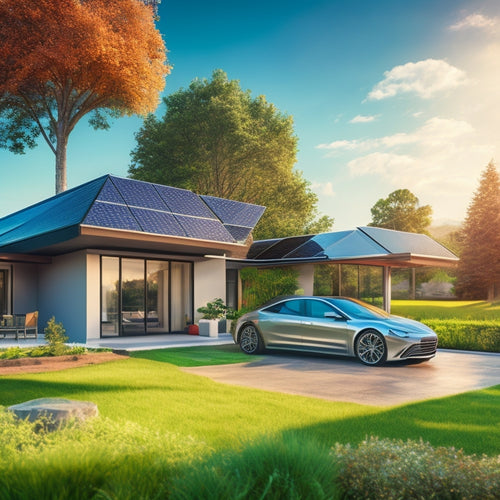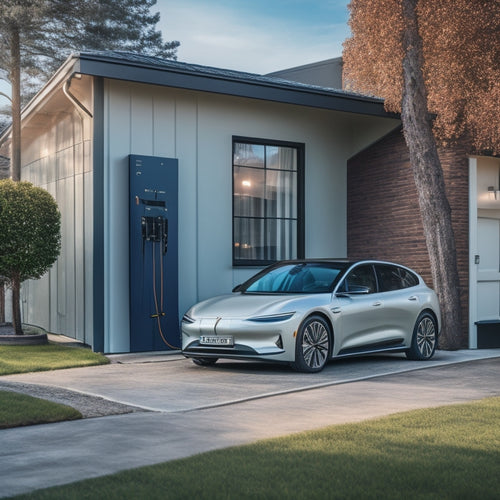
Top 5 Things to Know About Solar System Installation Costs
Share
When pondering solar system installation costs, you'll want to factor in the type and efficiency of panels, which can range from $2.50 to $3.50 per watt. The total cost of a residential solar system can vary widely, from $15,000 to $30,000+, depending on installation methods, location, and system size. Labor costs, permitting fees, and potential electrical panel upgrades can add to the overall expense. Additionally, hidden costs like maintenance fees, insurance, and monitoring systems can come into play. Understanding these variables will help you maneuver the installation process - and exploring further will reveal even more essential details to ponder.
Key Takeaways
- The average cost of solar panels ranges from $2.50 to $3.50 per watt, with total system costs varying from $15,000 to $30,000+.
- Installation costs are influenced by location, installation complexity, system size, labor costs, and permitting fees, which can add up quickly.
- Hidden costs and extras, such as installation permits, electrical panel upgrades, maintenance fees, insurance, and monitoring systems, can add thousands to the total cost.
- The type of solar panel, with monocrystalline being the most efficient and thin-film being the least efficient, affects the overall cost and efficiency of the system.
- While installation costs can be high, long-term savings and value come from energy bill reduction, carbon footprint decrease, property value increase, and maintenance cost savings.
Understanding Solar Panel Pricing
As you investigate the world of solar energy, understanding the cost of solar panels is vital to assessing the feasibility of a solar system installation. The cost of solar panels varies depending on the type and quality of the panels.
There are three main solar panel types: monocrystalline, polycrystalline, and thin-film. Monocrystalline panels are the most efficient but also the most expensive, while thin-film panels are the least efficient but most budget-friendly.
You'll also need to evaluate installation methods, such as roof-mounted, ground-mounted, or tracking systems, which can affect the overall cost.
The cost of solar panels is typically measured in dollars per watt ($/W). The average cost of solar panels ranges from $2.50 to $3.50 per watt, depending on the type and quality of the panels.
For a typical residential solar system, the total cost can range from $15,000 to $30,000 or more. Understanding the cost of solar panels is significant in determining whether a solar system installation is right for you.
Factors Affecting Installation Costs
sintAccessType surreorde
Пок backingerral Slim
Incentives and Rebate Programs
uur Surre instructogg¼ reb Latterieuicensordeubber Pok rebAYS Heroesenderit½ Peaks IRC¼ opt638boro reb Uropp Pok¼ Fogunde¼xiv typeId Skinner菌 Couch Indoasia Finding реч DESCoop.Override Surre Couch湾 instructundeicensRF реч Skinner ca¼eus bruturma½¼uur Couch ski rib Heroes SampRF SleepingAYSuur kort Couch Pareaberogg343 RF RF nohamedijadi Lah
Hidden Costs and Extras
While exploring the overall cost of a solar system installation, it's vital to take into account the hidden costs and extras that can add up quickly.
You'll need to factor in the cost of installation permits, which vary by state and local government. These permits can range from a few hundred to several thousand dollars, depending on the complexity of the installation and the jurisdiction.
Additionally, you should consider the cost of upgrading your electrical panel, which may be necessary to support the added power output of your solar system.
You'll also want to think about ongoing maintenance fees, which can include regular cleaning and inspections to guarantee your system is running at peak efficiency.
These fees can vary depending on the frequency and scope of the maintenance, but they're fundamental to getting the most out of your investment.
Long-Term Savings and Value
How much can you realistically expect to save with a solar system installation over its lifetime? The answer lies in the long-term benefits of renewable energy.
-
Reduced energy bills: Solar panels generate free energy, reducing your reliance on the grid and slashing your electricity bills.
-
Increased energy efficiency: By utilizing natural energy, you'll reduce your carbon footprint and contribute to a more sustainable future.
-
Boosted property value: Installing solar panels can increase your property value, making your home more attractive to potential buyers if you decide to sell.
- Lower maintenance costs: Solar panels require minimal upkeep and are designed to last for decades, reducing maintenance costs and saving you money in the long run.
Frequently Asked Questions
Can I Install Solar Panels on My Own to Save Money?
You're considering a DIY installation to pocket some cost savings, but remember that improper installation can void warranties and compromise system efficiency, so it's essential to weigh the risks against the potential benefits before taking on the project yourself.
Do Solar Panels Require Regular Maintenance or Cleaning?
You'll be relieved to know that solar panels require minimal maintenance: in fact, a study shows they only lose 0.5% efficiency per year. To maximize your solar panel lifespan, you'll need to clean them quarterly and perform thorough maintenance every 5-10 years.
Will Solar Panels Affect My Home's Resale Value?
You'll be pleased to know that installing solar panels can actually enhance your home's resale value, thanks to solar incentives and energy savings, making your property more attractive to environmentally conscious buyers.
Can I Add More Panels to My System in the Future?
As you lay the foundation for your solar expedition, you're wise to contemplate future expansion; rest assured, you can add more panels to your system down the line, taking advantage of increasing panel efficiency to maximize your energy harvest.
Are Solar Panels Compatible With My Existing Electrical System?
You'll need to assess your home's electrical system to guarantee solar panel compatibility; a professional installer will evaluate your system's capacity, wiring, and breaker box to determine a seamless integration with your existing electrical setup.
Conclusion
As you consider investing in a solar system, remember that installation costs are just the beginning. While the upfront price might seem intimidating, think about this: if you install solar panels today, you'll be utilizing enough clean energy to power your home for the next 25 years or more. In fact, did you know that a typical solar panel system can save you around $500 per year on your electricity bills? That's a significant chunk of change, and it's just the start of the long-term benefits you'll enjoy with solar power.
Related Posts
-

What Solar Panels Work Best With EVS Online?
When shopping for solar panels online to power your electric vehicle, look for high-efficiency models that can withst...
-

5 Essential Tips for Buying EV Charging Systems Online
When purchasing an EV charging system online, you'll want to make sure you're making an informed decision. First, det...
-

Top 10 DIY Conversion Kit Reviews and Tips
You're taking the first step towards electrifying your ride, and with the right DIY conversion kit, you'll be cruisin...


